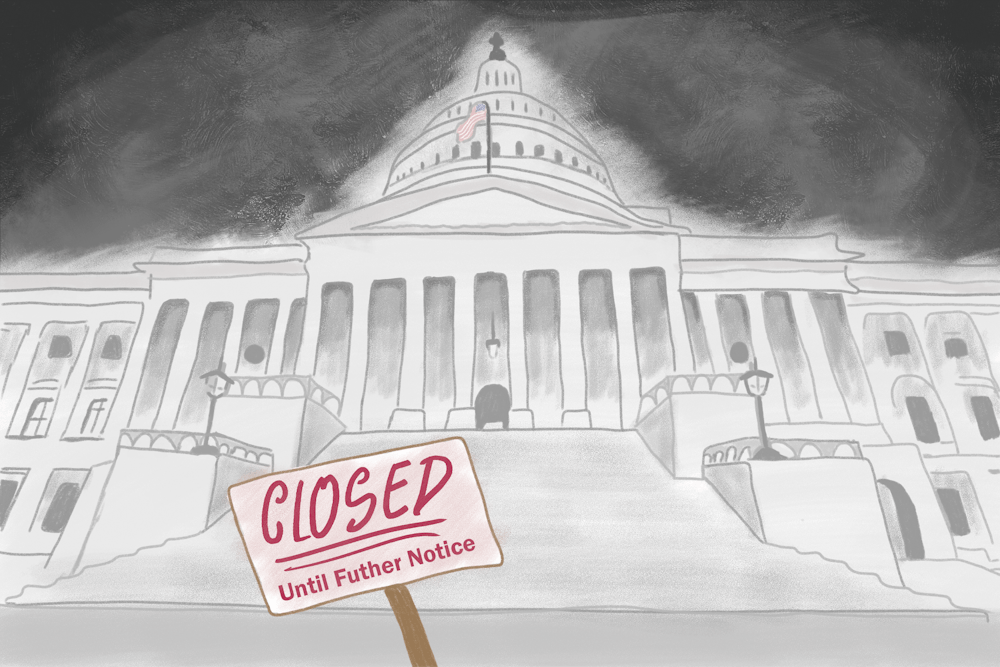Third-year computer science student Jaden Fairfax hasn’t been able to work in 29 days and isn’t sure when she will.
Her story isn’t unique — since the U.S. government shut down on Oct. 1 after failing to pass a spending bill, thousands of federal employees have gone without work and without pay.
Fairfax interns for Rep. William Timmons (R-SC) as part of the Washington Semester Program, but is one of the estimated 670,000 employees furloughed during the ongoing federal shutdown.
The Washington Semester Program provides college students across South Carolina with an opportunity to relocate to Washington for a semester to study and work. USC students take 15 credit hours, nine of which are a full-time internship on or off Capitol Hill. Five on-the-hill students in the Fall 2025 Washington Semester Program cohort have been furloughed.
Fairfax said her main concerns amid the shutdown are financial ones. Under normal circumstances, she receives a monthly stipend of $1,500 from the federal government, but she hasn’t been paid this month.
“I actually had to travel home this weekend to work because there’s no guarantee if I’m even going to get paid for this time,” Fairfax said. “(It has) put me under some financial strain and worried me a little bit.”
Deemed a non-essential worker, Fairfax said it is still unclear whether she will receive back pay after the government reopens. She’s had minimal communication with her internship office since the shutdown began.
“I reached out (to my office) one time because the program wanted to know the status of our pay, and all they said was that they were hopeful, but it’s ultimately not up to them, whether or not their furloughed workers get back pay,” Fairfax said.
South Carolina Honors College Associate Dean Andrea Tanner Kornegay, who oversees beyond-the-classroom programs including the Washington Semester, said the Honors College is working to financially aid furloughed students.
“What the Honors College is wanting to assure students of is that we’re going to support them financially … if they’re not receiving a paycheck,” Kornegay said. “It is our hope that they are going to get back pay once the government shutdown is over.”
Second-year computer information systems student Carter Threatt, who was furloughed from his internship with Rep. Ralph Norman (R-SC), said lack of pay might impact the mood of the city.
"I think that the mood is probably continuing to get more bleak as we approach missing ... a full month of pay for the House employees. I do think that we're going to continue to see ... spending in DC decline if this goes on," Threatt said.
Interns working for the Senate are still working because the Senate passed the continuing resolution. However, they are not receiving pay since the budget hasn't been passed by both legislatures.
When students’ internships were interrupted, the program had to find a way to adapt. Kornegay said the Honors College is finding alternative experiences for the furloughed students to complete throughout the shutdown. They are also creating rubrics to determine learning outcomes in case students are unable to return to their internships, Kornegay said.
The program has tried to supplement the loss of some students’ internships in a variety of ways, Kornegay said. These methods include in-depth exploration of the city, including neighborhoods, museums and the National Zoo, along with experiential reflection papers.
“It’s encouraged us to explore and get out of the house and see new things, and I’ve enjoyed it because I get to write about things that I’m seeing,” Fairfax said.

The Washington Semester Program also put out a call on Instagram to Washington-area professionals who are alumni of the program. The post requested opportunities for students to conduct informational interviews or shadow a professional in their job.
“We’ve had lots of Gamecock alums wanting to help in some way,” Kornegay said. “I think all of the (students impacted) have been connected with at least two alums that they’re going to have informational interviews and have some other connection with.”
Threatt said he has taken advantage of being out of work. He has attended lectures, been to theater productions and plans to meet with two USC alumni in the Washington area for informational interviews, he said.
“We're placed in our internships to learn and grow in our political understanding, but I would say that it really has just forced us to become more resourceful and nimble about where that education comes from,” Threatt said.
Furloughed students will receive all nine beyond-the-classroom credits for their internship, Kornegay said. Workload in the other two three-credit classes students take has not been affected.
Threatt said despite the hiatus from his job, the experience of being in the nation's capital still holds high value for him.
“Being immersed in the capitol city ... adds a dimension to our academic history that classrooms can't really replicate,” Threatt said. "We're living these experiences, not reading about them from Columbia, which is definitely different, but it doesn't erase the value of the program at all."

